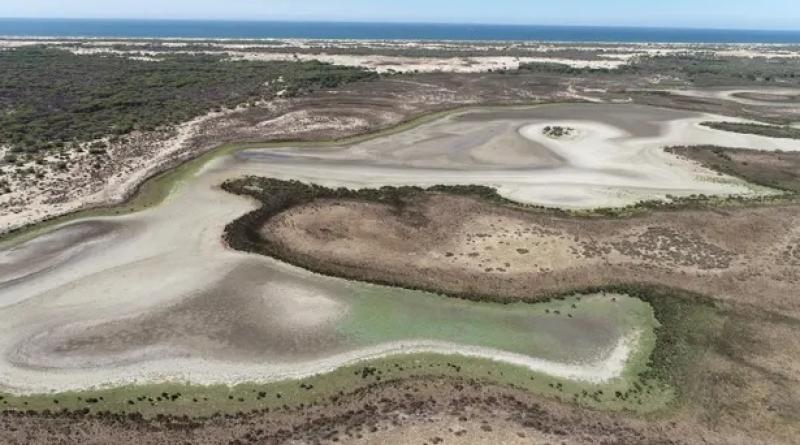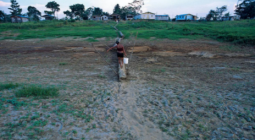Over-consumption and drought reduce lake in vital Spanish wetland to puddle

Experts and environmentalists say aquifer feeding Doñana national park, a Unesco heritage site, has been overexploited for tourism and to water fruit farms
The largest permanent lake in Spain’s Doñana national park, one of Europe’s biggest and most important wetlands, has shrivelled to a small puddle as years of drought and overexploitation take their toll on the aquifer that feeds the area and sustains millions of migrating birds.
On Monday, experts from Spain’s National Research Council (CSIC) said the Santa Olalla lake, which sits in a Unesco world heritage site, had dried up for the third time in 50 years.
“The Santa Olalla lake, the largest permanent lake in Doñana and the last one that still had water in August, has dried up,” the CSIC said in a statement. “In recent days, it has been reduced to a small puddle at its centre, where there are now no aquatic birds.”
Water supplies to Doñana, whose marshes, forests and dunes extend across almost 130,000 hectares (320,000 acres) in the Andalucían provinces of Huelva, Seville and Cádiz, have declined drastically over the past 30 years because of climate breakdown, farming, mining pollution and marsh drainage.
Environmental groups have long campaigned to protect the area – which is also home to a major population of endangered Iberian lynxes – saying that illegal wells sunk to feed the region’s numerous soft fruit farms were stressing the aquifer.
However, their warnings were ignored by rightwing MPs in the regional parliament, who voted earlier this year to “regularise” 1,461 hectares of land near the national park, allowing farmers who have sunk the illegal wells and built illicit plantations on the land to legitimise their operations.
“The continuous exploitation of the aquifer for intensive agriculture and human consumption – together with the dry years like this one – mean that not only are the Doñana’s temporary lakes disappearing, its permanent ones are also under threat,” said the CSIC.
The council said that while Doñana’s lakes, marshes and rice fields had historically offered a refuge to wildlife, 10 consecutive years of below-average rainfall had changed the local environment and forced many birds to seek alternative wetlands.
“Things have changed,” said Eloy Revilla, the director of the CSIC’s Doñana biological station. “Doñana no longer has permanent lakes, and the area of rice fields sown this year is a third of what it would normally be because of the lack of water.”
Revilla said that although the Santa Olalla lake had twice dried up completely during years of intense drought – in 1983 and 1995 – “the overexploitation of the Doñana aquifer is also responsible”.
The CSIC said the huge annual influx of summer visitors to the nearby tourist area of Matalascañas put a massive strain on water supplies. A camera placed in the lake by the council showed that it was “dry, parched and cracked; reduced to a tiny puddle of water and mud” on 31 August. But the next day, after many tourists had headed home, “a few springs were seen, suggesting the Doñana’s biggest permanent lake was being fed”.
Revilla said water use in Matalascañas needed to be reduced and restrictions imposed in dry years such as the present one.
“You can’t keep watering the lawns in Matalascañas while the lakes of Doñana dry up completely,” he said.
In 2013, Unesco – which declared the national park a world heritage site in 1994 – said that treasured status could be lost if efforts were not made to crack down on illegal water extraction to feed strawberry farms.
Last year, the European court of justice ruled that Spain had not fulfilled its obligations on preventing illegal water extraction around Doñana and had failed to take the measures needed to stop “significant alterations” to its protected habitats.
On Saturday, Juan Carlos del Olmo, the president of WWF Spain, tweeted: “Doñana isn’t drying up; it’s been plundered! A real environmental assault carried out right before the authorities who are responsible and for which Spain has been convicted.”
cover photo: Experts say the Santa Olalla lake has dried up for the third time in 50 years. Photograph: CSIC




